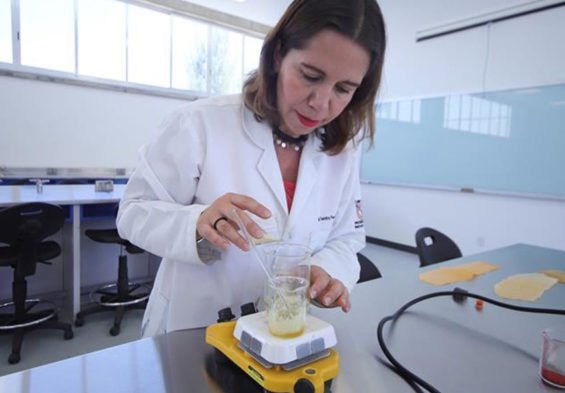A researcher from Guadalajara, Jalisco, has created a biodegradable, natural plastic that could be used to make eco-friendly shopping bags. Its source? The juice of the nopal cactus.
Sandra Pascoe of the University of the Valley of Atemajac (Univa) told the news agency EFE that she has used both the most common variety of edible nopal — the opuntia ficus-indica — and the opuntia megacantha, which is known for its fruit called tuna, to make her innovative product.
“The plastic is basically made out of the sugars of nopal juice, the monosaccharides and polysaccharides it contains,” she said.
Pascoe explained that the sugars, pectin and organic acids in the juice give it a very viscous consistency, adding “that viscosity is what we’re taking advantage of so that a solid material can be produced.”
Glycerol, natural waxes, proteins and colorants are mixed with the juice after it has been decanted to remove its fiber, creating a formula that is then dried on a hot plate to produce thin sheets of plastic.

The process was registered with the Mexican Institute of Industrial Property (IMPI) in 2014 and the National Council of Science and Technology (Conacyt) has contributed funding to advance the project.
The researcher said that she is now collaborating with the University of Guadalajara Center for Biological and Agricultural Sciences to determine how quickly and under what conditions the plastic will decompose.
“We’ve done very simple degradation tests in the laboratory; for example, we’ve put it in water and we’ve seen that it does break down [but] we still have to do a chemical test to see if it really did completely disintegrate. We’ve also done tests in moist compost-like soil and the material also breaks down,” Pascoe said.
She explained that in addition to shopping bags, the nopal juice plastic could be used to make products such as cosmetic containers, imitation jewelry and toys.
Tests are currently being conducted to establish how much weight the plastic can bear which will help determine what other products it could be used for.
Pascoe said the next step on the path towards commercialization will be to make or buy a machine that can make prototypes of the plastic bags in order to market them to businesses.
The scientist is also in the process of applying for a patent for her product from IMPI, which she said would allow interested companies to use the process she developed under a licensing agreement.
Source: Vanguardia (sp)
